世纪大学英语UNITCollegelife
- 格式:ppt
- 大小:879.00 KB
- 文档页数:17
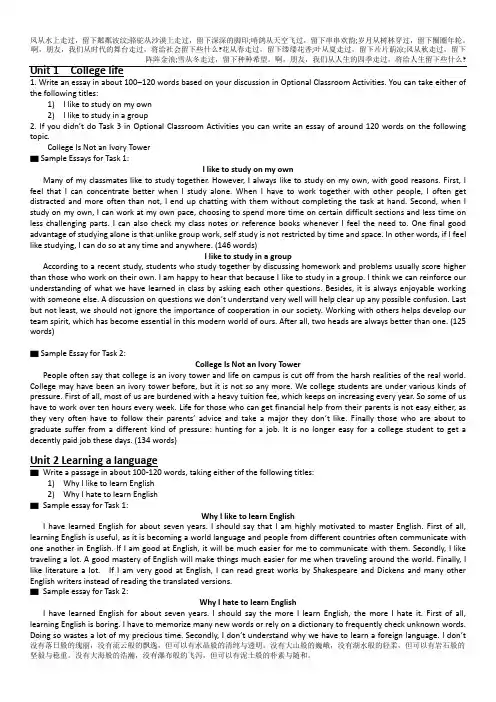
Unit 1 College life1. Write an essay in about 100–120 words based on your discussion in Optional Classroom Activities. You can take either of the following titles:1) I like to study on my own2) I like to study in a group2. If you didn’t do Task 3 in Optional Classroom Activities you can write an essay of around 120 words on the following topic.College Is Not an Ivory Tower▆ Sample Essays for Task 1:I like to study on my ownMany of my classmates like to study together. However, I always like to study on my own, with good reasons. First, I feel that I can concentrate better when I study alone. When I have to work together with other people, I often get distracted and more often than not, I end up chatting with them without completing the task at hand. Second, when I study on my own, I can work at my own pace, choosing to spend more time on certain difficult sections and less time on less challenging parts. I can also check my class notes or reference books whenever I feel the need to. One final good advantage of studying alone is that unlike group work, self study is not restricted by time and space. In other words, if I feel like studying, I can do so at any time and anywhere. (146 words)I like to study in a groupAccording to a recent study, students who study together by discussing homework and problems usually score higher than those who work on their own. I am happy to hear that because I like to study in a group. I think we can reinforce our understanding of what we have learned in class by asking each other questions. Besides, it is always enjoyable working with someone else. A discussion on questions we don’t understan d very well will help clear up any possible confusion. Last but not least, we should not ignore the importance of cooperation in our society. Working with others helps develop our team spirit, which has become essential in this modern world of ours. After all, two heads are always better than one. (125 words)▆ Sample Essay for Task 2:College Is Not an Ivory TowerPeople often say that college is an ivory tower and life on campus is cut off from the harsh realities of the real world. College may have been an ivory tower before, but it is not so any more. We college students are under various kinds of pressure. First of all, most of us are burdened with a heavy tuition fee, which keeps on increasing every year. So some of us have to work over ten hours every week. Life for those who can get financial help from their parents is not easy either, as they very often have to follow their parents’ advice and take a major they don’t like. Finally those who are about to graduate suffer from a different kind of pressure: hunting for a job. It is no longer easy for a college student to get a decently paid job these days. (134 words)Unit 2 Learning a language▆Write a passage in about 100-120 words, taking either of the following titles:1) Why I like to learn English2) Why I hate to learn English▆Sample essay for Task 1:Why I like to learn EnglishI have learned English for about seven years. I should say that I am highly motivated to master English. First of all, learning English is useful, as it is becoming a world language and people from different countries often communicate with one another in English. If I am good at English, it will be much easier for me to communicate with them. Secondly, I like traveling a lot. A good mastery of English will make things much easier for me when traveling around the world. Finally, I like literature a lot. If I am very good at English, I can read great works by Shakespeare and Dickens and many other English writers instead of reading the translated versions.▆Sample essay for Task 2:Why I hate to learn EnglishI have learned English for about seven years. I should say the more I learn English, the more I hate it. First of all, learning English is boring. I have to memorize many new words or rely on a dictionary to frequently check unknown words. Doing so wastes a lot of my precious time. Secondly, I don’t understand why we have to learn a foreign language. I don’twant to go abroad and I can always find a job that doesn’t need English in China. Finally, I can always read translated versions of the books I want to read. So, i f I don’t have to learn English, I would rather use the time I spend on English to do things I like.Unit 3 Parents and Children1.In about 100-120 words, write about an incident of misunderstanding between you and your mother/father. Tell usabout how it all started and what happened in the end.2.In about 100-120 words, describe the similarities and differences in the way your father and mother show their lovefor you . Be sure to give examples.▆Sample essay for Task 1A misunderstanding between my mother and IOne afternoon, I was wandering along the main street of our small town with a friend. Suddenly I saw my mother. She was behaving very strangely. She looked around her before going quickly into a shop. When she came out, she had a box in her hand. I was terrified. I knew some of my villagers resorted to theft because they were poor. The thought that my mother could be one of them drove me crazy. I was determined to find out the truth from her. When I questioned her, tears filled her eyes. She told me she was collecting beer cans from some kind shop owners who offered them to her, but would feel embarrassed if she was seen by others. I cried and hugged her and felt sorry that I had misunderstood my own mother.▆Sample essay for Task 2:My parents’ loveMy parents differ greatly in showing their love for me. While my mother appears more anxious and depressed if anything goes wrong with me, my father tends to be silent and expresses his concern for me mainly through actions rather than words. I still remember the day when I left home for university. When my mother was in tears and kept giving me endless advice, my father remained silent. But when he saw an ice-cream man on the platform, he rushed towards him and got me an ice-cream just before the train started to move. I learned from my mother later that my father locked himself up in his room after returning home and cried for the first time in his life. I never expected that my departure would trigger such an emotional response from my father.Unit 4 Growing up1. In about 100-120 words, write about a conflict you once had with your parents .You can start with either of the following openings:1) I was very unhappy with my mother/father the other day…2) I was grateful that my mother/father criticised me the other day…2.Describe your attitude toward your father or mother when you were a teenger. When you could not agree with each other, what did you do? Use an incident from daily life to support the description.▆Sample essay for Task 1:I was very unhappy with my mother /father the other day. . .I was very unhappy with my father the other day. He must have called out to me for help with some housework, but I was so absorbed in reading that I did not hear him. He stepped into my room , apparently in anger, grabbed my book and threw it on the floor. I got upset and insisted he should pick it up and apologize to me. When he remained silent, I ran out and went off to play games with friends in the neighbourhood. When it was turning dark, I saw my father looking for me. He patted me on the head walked back home with me, his arm wrapped around my shoulder. When I got home, I saw my book had "returned" to my reading table.▆Sample essay for Task 2:I was very grateful that my mother /father criticised the other day. . .I was grateful that my mother criticised me the other day. I had been asking her for money to buy all kinds of things that my friends have--a new pair of shoes or some new clothes. Every time I was refused, I played the same trick -- threatening to pour the dish she cooked for the family into the river. My mother gave in each time I threatened to do that, but one day, she criticised me really hard. She scolded me for being selfish and inconsiderate and asked me to sit in acorner and reflect on my own behavior. I could not believe my mother could be so angry with me and I grew afraid. I learned a good lesson and changed a lot afterwards. I was thankful that my mother made me realize my mistakes.▆Sample essay for Task 2:I was so proud of my fatherMy father is a well-known carpenter in my village. I still remember that when I was in my mid-teens, I used to adore him make furniture for the villagers. He not only had good skills, but he was also willing to help the villagers with minor repairs such as mending a broken window frame or fixing a door, without charge. All the villagers respected him. They also paid me compliments when they saw me helping him , saying that I would grow up to become honest and industrious just like my father. I was so proud that I had a father who was so well respected.Unit 5 Knowing YourselfWrite a passage of about 100-120 words according to one of the instructions given below.1) Describe a few of your own personality traits. Then identify your favourite colour and see if the descriptions of the colour in Text B match your personality.2) Think of the person you admire most. Write two personality traits that you like most about this person. Remember to give an example for each personality trait.3) Imagine that you had been given a wish to change your life. Write about two personality traits that you would like to have and give your reasons.4) Write about a person whom you dislike most and give one or two reasons or examples why you dislike him or her so much.▆Sample essay 1)I have been described by many friends as a warm, sociable, and outgoing extravert. I find it easy to make new friends and I enjoy the company of people who share similar characteristics as I. When I am at a party, many people including those I do not know, will talk to me. I am not a great beauty, neither am I rich and intelligent. In fact, I am just a very simple person who is happy and smiles a lot. Maybe being happy is the attraction. I like bright colours, especially red. It is said that people who like red are passionate and have a lot of energy. I agree that I am enthusiastic about many things and like doing many things at the same time. So it seems there is some truth after all in what colours say about a person’s personality.▆Sample essay 2)The person I admire most is my father’s youngest brother. He is known to us as ba shu because he is the eighth son in a family of eleven. He is a high achiever. Since young, he has done well in his studies and work. For example, he received a prestigious scholarship to study at a well-known medical school in England. Today, at the age of 62, he is still as outgoing. He is a well-respected surgeon and has won many awards. What I like most about ba shu is his sensitive nature, especially toward children who are born unlucky. He has volunteered his time and made sacrifices to help those in poor and developing countries. His strong desire to bring happiness to these people has impress me a lot.▆Sample essay 3)If I were given a wish to have two personality traits, I would choose to be an optimistic person because those who are optimistic are usually satisfied and content with what they have. They seldom let sadness be a part of their life. I want to be happy and being optimistic is one way to remain happy. I also would like to be creative. I think that creativity is inherited. Some may disagree and say that we can learn to be creative. However, no matter how hard one learns, it is those born with the talent of creativity who will make a great name for themselves like the famous poet Li Bai and the richest man in the world, Bill Gates.▆Sample essay 4)There is no one person I disagree most but there are a couple of personality traits that I cannot tolerate: aggressiveness and selfishness. Aggressive people do not consider other’s feelings and will not think twice about hurting even those closest to them. I once had a neighbour who would beat his wife one day and appear loving the next. His wife lived in fear constantly but could do nothing because he was in control of her. Another personality trait I dislike is selfishness. Likeaggressive people, selfish people only think of themselves. There are many everyday examples of selfishness such as those not willing to lend things to others and those not wanting to share exam tips even with their best friends. If you know someone with a combination of aggressiveness and selfishness, you should consider whether to call him or her a friend.。
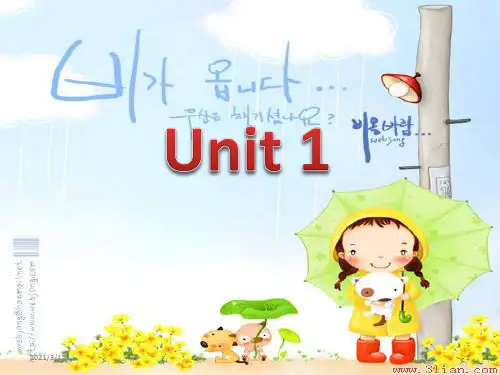
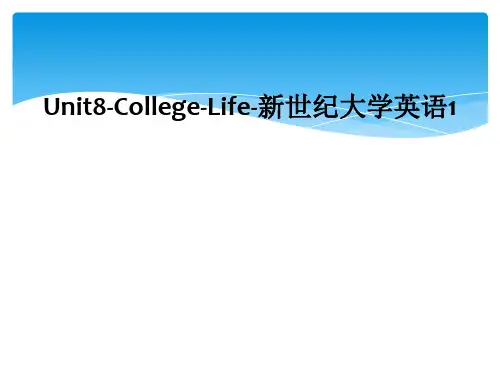
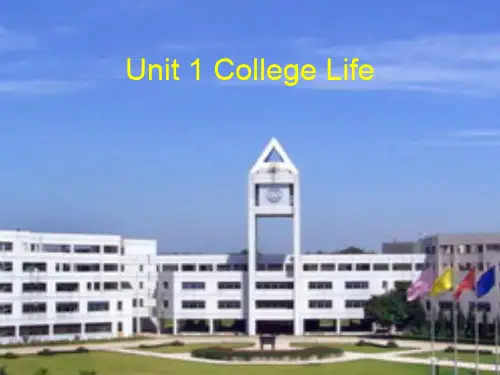
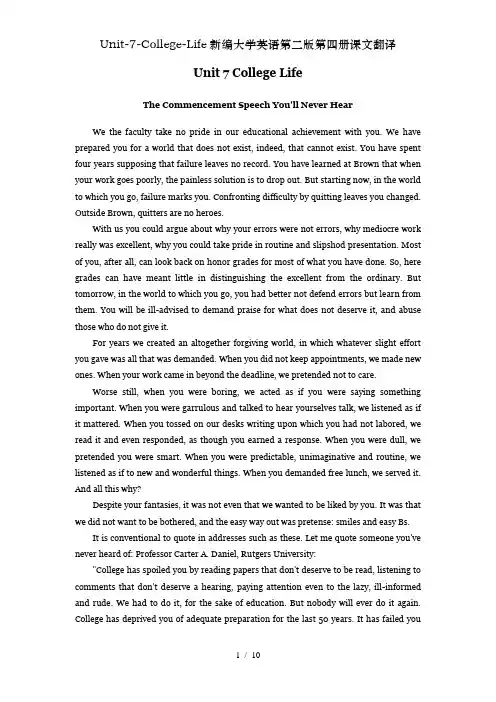
Unit 7 College LifeThe Commencement Speech You'll Never HearWe the faculty take no pride in our educational achievement with you. We have prepared you for a world that does not exist, indeed, that cannot exist. You have spent four years supposing that failure leaves no record. You have learned at Brown that when your work goes poorly, the painless solution is to drop out. But starting now, in the world to which you go, failure marks you. Confronting difficulty by quitting leaves you changed. Outside Brown, quitters are no heroes.With us you could argue about why your errors were not errors, why mediocre work really was excellent, why you could take pride in routine and slipshod presentation. Most of you, after all, can look back on honor grades for most of what you have done. So, here grades can have meant little in distinguishing the excellent from the ordinary. But tomorrow, in the world to which you go, you had better not defend errors but learn from them. You will be ill-advised to demand praise for what does not deserve it, and abuse those who do not give it.For years we created an altogether forgiving world, in which whatever slight effort you gave was all that was demanded. When you did not keep appointments, we made new ones. When your work came in beyond the deadline, we pretended not to care.Worse still, when you were boring, we acted as if you were saying something important. When you were garrulous and talked to hear yourselves talk, we listened as if it mattered. When you tossed on our desks writing upon which you had not labored, we read it and even responded, as though you earned a response. When you were dull, we pretended you were smart. When you were predictable, unimaginative and routine, we listened as if to new and wonderful things. When you demanded free lunch, we served it. And all this why?Despite your fantasies, it was not even that we wanted to be liked by you. It was that we did not want to be bothered, and the easy way out was pretense: smiles and easy Bs.It is conventional to quote in addresses such as these. Let me quote someone you've never heard of: Professor Carter A. Daniel, Rutgers University:"College has spoiled you by reading papers that don't deserve to be read, listening to comments that don't deserve a hearing, paying attention even to the lazy, ill-informed and rude. We had to do it, for the sake of education. But nobody will ever do it again. College has deprived you of adequate preparation for the last 50 years. It has failed youby being easy, free, forgiving, attentive, comfortable, interesting, unchallenging fun. Good luck tomorrow.That is why, on this commencement day, we have nothing in which to take much pride.Oh, yes, there is one more thing. Try not to act toward your co-workers and bosses as you have acted toward us. I mean, when they give you what you want but have not earned, don't abuse them, insult them, act out with them your parlous relationships with your parents. This too we have tolerated. It was, as I said, not to be liked. Few professors actually care whether or not they are liked by peer-paralyzed adolescents, fools so shallow as to imagine professors care not about education but about popularity. It was, again, to be rid of you. So go, unlearn the lies we taught you. To life!你将永远不会听到的毕业演讲1 我们这些教师对于在你们身上取得的教育成就一点都不感到自豪。
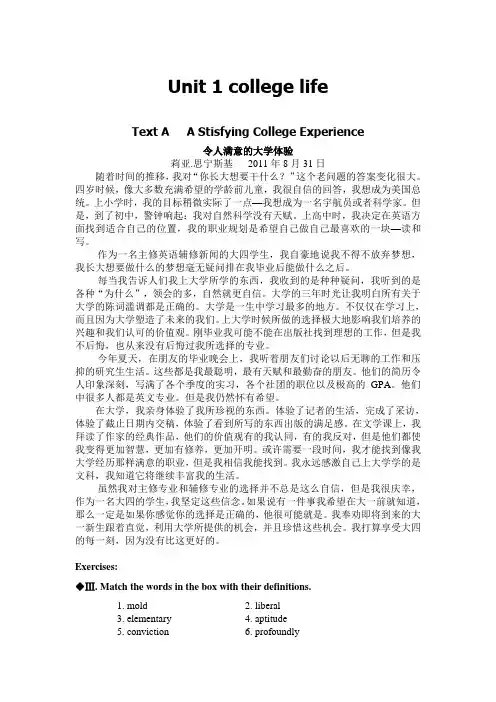
Unit 1 college lifeText A A Stisfying College Experience令人满意的大学体验莉亚.思宁斯基2011年8月31日随着时间的推移,我对“你长大想要干什么?”这个老问题的答案变化很大。
四岁时候,像大多数充满希望的学龄前儿童,我很自信的回答,我想成为美国总统。
上小学时,我的目标稍微实际了一点—我想成为一名宇航员或者科学家。
但是,到了初中,警钟响起:我对自然科学没有天赋。
上高中时,我决定在英语方面找到适合自己的位置,我的职业规划是希望自己做自己最喜欢的一块—读和写。
作为一名主修英语辅修新闻的大四学生,我自豪地说我不得不放弃梦想,我长大想要做什么的梦想毫无疑问排在我毕业后能做什么之后。
每当我告诉人们我上大学所学的东西,我收到的是种种疑问,我听到的是各种“为什么”,领会的多,自然就更自信。
大学的三年时光让我明白所有关于大学的陈词滥调都是正确的。
大学是一生中学习最多的地方。
不仅仅在学习上,而且因为大学塑造了未来的我们。
上大学时候所做的选择极大地影响我们培养的兴趣和我们认可的价值观。
刚毕业我可能不能在出版社找到理想的工作,但是我不后悔,也从来没有后悔过我所选择的专业。
今年夏天,在朋友的毕业晚会上,我听着朋友们讨论以后无聊的工作和压抑的研究生生活。
这些都是我最聪明,最有天赋和最勤奋的朋友。
他们的简历令人印象深刻,写满了各个季度的实习,各个社团的职位以及极高的GPA。
他们中很多人都是英文专业。
但是我仍然怀有希望。
在大学,我亲身体验了我所珍视的东西。
体验了记者的生活,完成了采访,体验了截止日期内交稿,体验了看到所写的东西出版的满足感。
在文学课上,我拜读了作家的经典作品,他们的价值观有的我认同,有的我反对,但是他们都使我变得更加智慧,更加有修养,更加开明。
或许需要一段时间,我才能找到像我大学经历那样满意的职业,但是我相信我能找到。
我永远感激自己上大学学的是文科,我知道它将继续丰富我的生活。
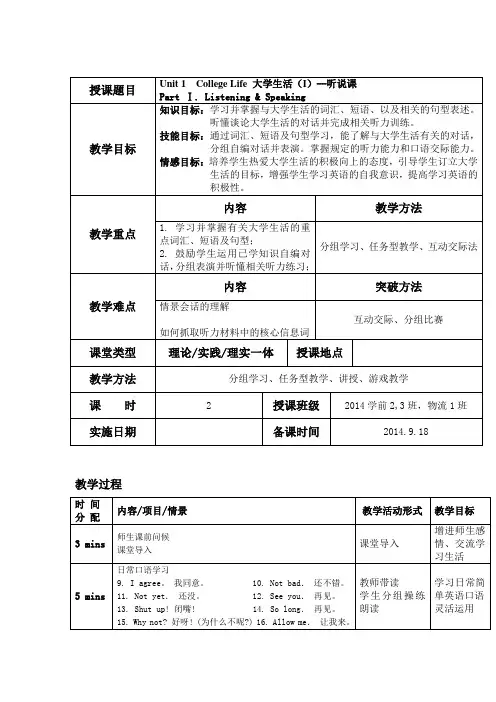
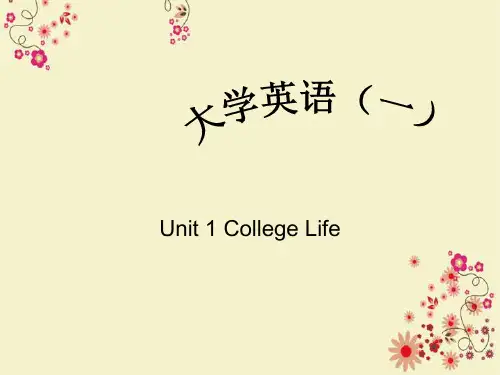
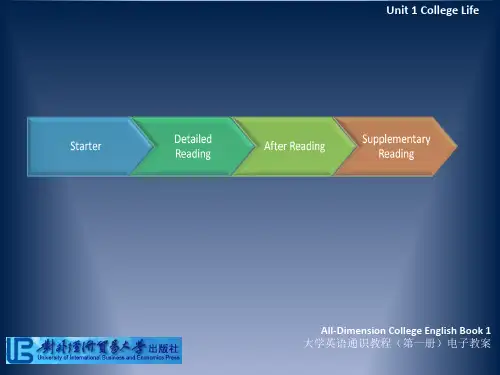

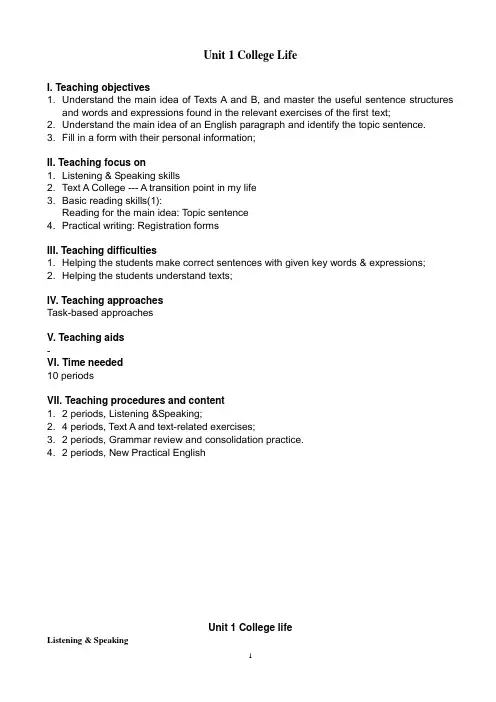
Unit 1 College LifeI. Teaching objectives1. Understand the main idea of Texts A and B, and master the useful sentence structuresand words and expressions found in the relevant exercises of the first text;2. Understand the main idea of an English paragraph and identify the topic sentence.3. Fill in a form with their personal information;II. Teaching focus on1. Listening & Speaking skills2. Text A College --- A transition point in my life3. Basic reading skills(1):Reading for the main idea: Topic sentence4. Practical writing: Registration formsIII. Teaching difficulties1. Helping the students make correct sentences with given key words & expressions;2. Helping the students understand texts;IV. Teaching approachesTask-based approachesV. Teaching aids-VI. Time needed10 periodsVII. Teaching procedures and content1. 2 periods, Listening &Speaking;2. 4 periods, Text A and text-related exercises;3. 2 periods, Grammar review and consolidation practice.4. 2 periods, New Practical EnglishUnit 1 College lifeListening & SpeakingLead inThe teacher explains the Lead-in so that the students will have some idea of what this unit is about. Then, the teacher writes the word “freshmen” on the blackboard and lets the studentsA. guess the meaning of the word;B. tell how they feel now that they are in college and what problems they have;C. have a look at the words and expressions in the box;D. watch the video and tell what is said in the video with help from the teacher;E. do the True or False exercise and watch the video again;F. exchange their views on life in college.Listening & SpeakingAfter the Lead-in, the teacher asks the students to do the following:1) Introducing YourselfA. Listen to the first half of the short talk in Ex. 1 twice and fill in the missing words;B. Listen to the second half of the short talk in Ex. 1 twice and fill in the missing words;C. Listen to the whole short talk and do Ex. 2.2) Getting to Know PeopleA. Go through the new words in Ex. 3 and listen to the conversation twice while filling in the missing words;B. Answer the questions by way of group discussion or the traditional teacher-student interaction;C. Do Ex. 4 in pairs;D. Go through the new words in Ex. 5 and watch the video twice while filling in the missing words;E. Do Ex. 6 in pairs. One student asks the question and the other student answers it. Then they switch roles anddo it again.3) Listening PracticeBefore ending class, the teacher tells the students how to do the exercises in Listening Practice as their homework. The teacher also tells the students that they should be prepared to answer the questions and give an oral presentation in class when they next come to class.Text A College – A Transition Point in My Life1) StarterAfter a brief explanation of the instructions, the teacherA. let the students list the things that they were excited and worried about when they first got to college. This can be done in complete English sentences or just phrases. If the students have difficulty doing this, the teacher should provide them with the following key words in English: (for things students may be excited about) beautiful campus, good library, teachers and classmates, the computer room, the environment, new way of life, etc.; and (for things students may be worried about) being away from home, the food, competition with other students, difficulties in study, washing clothes, taking a bath or shower, new teachers, etc.;B. organizes pair work or group discussion among the students, which should last for about 5 minutes only, and then gives the students 10 minutes to read Text A and find out the things that worried the writer when he first got to college.2) Text A: College — A Transition Point of My LifeThe teacherA. discusses the whole text with the students;B. guides the students through the exercises, focusing on certain items or leaving some exerci ses as the students’ homework a ccording to the students’ levels.Read the new words and expressionsParagraph 11. Transition: n. (instance of) changing from one state or condition to another 过渡;转变2. Title of Text A: Author Unknown: The name of this writer is not known. 佚名作者.Language Points1. Enter: vt. go or come into (a place) 进入 e.g. enter a room/ a house 进入房间/房子As soon as he entered the room, he saw his father and mother.他一进屋就看到了父母。
新世纪大学英语综合教程第二版第一册教程Electronic Teaching PortfolioBook OneUnit One: College LifePart I Get StartedSection A Discussion▇ Sit in groups of threes or fours and discuss the following questions.1. You may have imagined what college life would be like before you became a college student. Has it turned out to be what you expected? Provide examples in support of your answers.2. Whenever you think about college life, what are some of the things that come to mind? Following the examples given, make a list of such things in the following table. Share your answers with your group members and comment on each of the items you have listed as you go along.3. How do you like your college life so far? Give examples.4. What do you think is the most important thing to achieve at college? Explain.▇ Answers for reference:1. Possible positive comments on college life may include the following:academic atmosphere, good student accommodations, modern facilities for teaching and research, qualified professors, nice classmates, etc.Possible negative comments on college life may include the following:hard to get adjusted to the new environment, academic pressure, homesickness, problems in interpersonal relationships, poor food, etc.2.3. Possible examples are: carefree and colorful life, academic environment, friendship, a door leading to the outside world, etc.However, college life may also be boring for some students, because most of their time is spenton study, and they are far away from home, etc.4. Possible answers are: academic excellence, developing communicative skills and interpersonal relationshipsSection B Quotes▇Study the following quotes about education and see if you accept the ideas expressed in the quotes.Ralph Waldo Emerson⊙The things taught in schools and colleges are not an education, but the means to aneducation.— Ralph Waldo Emerson Interpretation:We don’t go to school or college to learn, but to seek the way to learn.About R. W. Emerson (1803–1882): R. W. Emerson,a US poet and writer who had great influence on the religious and philosophical thought of his time.W. B. Yeats⊙Education is not the filling of a pail, but the lighting of a fire.— W. B. Yeats Interpretation:Instead of stuffing students with knowledge, real education aims at bringing out what is inside students and cultivating their potential.About W. B. Yeats (1865–1939): W. B. Yeats, an Irish writer of poems and plays, whose early work is often based on old Irish stories. He is considered one of the most important Irish writers, and he won the Nobel Prize for Literature in 1923.Galileo⊙You cannot teach a man anything; you can only help him find it within himself.—GalileoInterpretation:Teaching doesn’t really help anyone, but it helps a person find out what he/she is good at.About Galileo (1564–1642): Galileo, an Italian astronomer, mathematician, and physicist whose many discoveries had a great influence on modern science. He discovered mountains and craters (月球表面的环形山) on the surface of the Moon, and his study of the changes in the appearance of Venus (金星) proved that it was moving around the Sun. He also discovered that if you drop objects of different weights from a high place, they fall at the same speed. He was punished by the inquisition (宗教法庭) because he believed that the Sun, not the Earth, was the centre of the universe.Section C Watching and Discussion▇Watch the following video clip “How to Select Your College major” and do the tasks that follow:插入视频片段:“How to Select.wmv”1.Fill in the missing words according to what you hear from the video clip.Hi, this is Laura Turner, and today I’m going to talk to you about how to select your college major. I would like to tell you that if you select something that you love and that you’re passionate about, everything’s going to be fine and you’re going to get a great job with your degree, but of course this is not completely true. However, when you’re going to college, your primary reason for going to college is to educate yourself, which means to make yourself a better person both intellectually, spiritually, mentally, all of these things.2.Discuss the topic with your group members:What are the recommended concerns in selecting a college major according to the video clip?And how did you choose your current major?▇Answers for reference:According to the video clip, the main concerns should be: first, to choose something you really enjoy; second, to choose something your school is well known for.Script:Hi, this is Laura Turner, and today I’m going to talk to you about how to select your college major. I would like to tell you that if you select something that you love and thatyou’re passionate about, everything’s going to be fine and you’re going to g et a great job with your degree, but of course this is not completely true. However, when you’re going to college, your primary reason for going to college is to educate yourself, which means tomake yourself a better person both intellectually, spiritually, mentally, all of these things. So, whenever you choose your major, I would say yes, do choose something that you enjoy,because really if you are just in it to get a degree that will get you a high-paying job andyou’re not really passionate about this and you want to be an Engineering Major justbecause you know that’s going to make you into a high earning person, that may be thewrong reason to study it because you’re going to get overwhelmed over time because adegree takes, it’s four years out of your life that you’re going to be studying this thing. There has to be something beyond money, and beyond the job that’s going to keep you interested.So I would suggest picking something that you love as well as, hopefully, it will besomething that will get you a job. Also, my other point is, pick something that your school is well known for, something in your school, the major in your school that actually has really great professors to teach you. If you have a great English Department, if you have a greatH istory Department, and you’re passionate about those things, study with professors whoare great and they can help turn a little bit of interest in a subject matter into a lifelong love of it. So good luck with choosing your major wisely.Part II Listen and RespondSection A Word BankSection B Task One: Focusing on the Main Ideas1. Choose the best answer to complete each of the following sentences according to the information contained in the listening passage.1)In this monologue the speaker mainly talks about ________.A)stories about college lifeB)the life of college freshmenC)carefree life of college studentsD)differences between college and high school2)According to the speaker, the freshman experience will ________.A)enable students to find true friendshipB)leave a deep impression on every studentC)decide what a student can do in the futureD)teach students the importance of responsibility▇Key:1) B) 2) C)2. Read the following statements and decide whether each of them is true or false based on the information contained in the listening passage. Write T for True and F for False in the space given before each statement.1)________ Freshman experience is an unforgettable experience to college students.2)________Students will feel just as comfortable in their first year at college as in their previousyears when they were in high school or back at home.3)________ Students are able to find very good friends at college.4)________ Learning to be responsible for oneself at college is very important.5)________ Freshmen should not be concerned with their future careers.▆Key:1)T2) F3)T4)T5) FSection C Task Two: Zooming in on the DetailsListen to the recording again and fill in each of the blanks according to what you have heard. 1)The freshman year at college is, generally speaking, a time filled with _____________, someanxiety, and _________________________________.2)The workload will be ______________ and the major challenges of college work are a largeamount of ___________________ and the short ______________.3)College Friendship will be among the _____________________________ and_______________________ of one’s life. It’s always exciting to discover how________________________________ college relationships can be.4)Students should remember that they are at college with an _____________________: theyshouldn’t waste time on ___________________________.5)Going to college is not just to get a degree: it is to find out ___________________ and____________________________________.▇Answers for reference:1)The freshman year at college is, generally speaking, a time filled with anticipation, someanxiety, and wonderful discoveries.2)The workload will be heavier and the major challenges of college work are a large amount ofreading and writing and the short deadlines.3)College friendship will be among the most satisfying and long-term of one’s life. It’s alwaysexciting to discover how wonderfully diverse college relationships can be.4)Students should remember that they are at college with an anticipated mission; theyshouldn’t waste time on meaningless things.5)Going to college is not just to get a degree; it is to find out who you are and what you areI am now a fourth-year student at college, but I can never forget my freshman year here. In general, it is a time filled with anticipation, some anxiety, and wonderful discoveries.College is a lot different from high school. Your freshman experience will definitely make an impression on you. So, what can you expect as you head off into the wonderful world of higher education?The first thing you’ll notice is the workload. It will be heavier than you ever experienced before. The major challenges of college work are the large amount of reading and writing, and the short deadlines. A related effect that can be brought on by the workload is doubt, frustration, and possibly loneliness. You’ll be away from the comforts and friendships your home provided for you over the previous years.During the freshman year, you’ll be making a lot of new friends. But you should continue to be yourself. Select your friends with the same care and patience you have always shown. Believe it or not, your college friendships will be among the most satisfying and long-term of your life. It’s always exciting to discover how wonderfully diverse college relationships can be.You’ll also be on your own —you’ll be your own boss 24 hours a day, so to speak. But, remember, with freedom comes responsibility. You should always remember that you are at college with an anticipated mission. Don’t waste your time on meaningless things.During the freshman year, you may even start thinking about your future. Maybe a certain professor is especially inspiring. Perhaps your school has some great research going on. If some area of study attracts you, find out all you can about it. It might be the beginning of your lifetime career. Going to college is not just to get a degree — it is to find out who you really are and what you are really made for.Part III Read and ExploreText ASection A Discovering the Main IdeasExercise 1. Write down the main idea of the following paragraphs in the space provided.1)Para 2: ____________________________________________________________________________________________________________________________.2)Para 3: ____________________________________________________________________________________________________________________________.3)Para 4: ____________________________________________________________________________________________________________________________.4)Para 5: ____________________________________________________________________________________________________________________________.5)Para 6: ____________________________________________________________________________________________________________________________.▆Answers for reference:1)Para 2: Top students attain academic excellence by mastering a few basic principles thatothers can easily learn.2)Para 3: Top students learn to be organized.3)Para 4: Top students know how to schedule their time properly.4)Para 5: Top students are very serious about school and very active in class.5)Para 6: Students benefit from group study.Exercise 2: Read the following statements and then decide whether each of them is true or false based on the information in the text. Write T for True and F for False in the space provided before each statement.1)______ Being bright does not necessarily make one a straight-A student.2)______ A top student knows how to balance between what is more important and whatis lessimportant.3)______ One student thinks that learning a new word while brushing his teeth helps himlearn thenew word best.4)______ A messy student may waste a lot of time.5)______ Professors may concentrate more on the neatness of an assignment than on itscontent.6)______ Students benefit more from group study than from individual study.7)______ Pressure from parents is good for students.▆Answers for reference:1)T2)T3) F The student does so in order to save time.4)T5) F The student who turns in neat work is a step closer to a high score.6)T7)F Encouragement rather than pressure from parents helps students a lot.Exercise 3:Summarize the basic principles that top students master and apply in their studying and put them down in the space provided.▆Answers for reference:Section B In-depth StudyWorking towards academic excellence constitutes one of the most important parts of college life and is the goal of most college students. Straight-A students, in this respect, can be of great help by sharing their secrets in achieving academic excellence. Read the following text to find out what some of these secrets are.Secrets of Straight-A Students1 A professor of education who has conducted major studies of super-achieving students revealed that top grades do not always go to the brightest students. According to him, other education experts and top students themselves, it is far more important for a student to know how to make the most of his or her innate abilities.2 The students at the top of the class attain academic excellence by mastering a fewbasic principles that others can easily learn.To begin with, top students know how to set their priorities right. Study time is never compromised for phone calls, television programmes or snacks.In other words, it is always placed above recreation. In addition, top students make a point of studying anywhere or everywhere. A top student who is also a top athlete memorises biology terms as he works out every day. Another student learns a new word every morning while brushing his teeth. Among all the students interviewed, every one agreed that study times are strictly a matter of personal preference. Some thrive at night when all is silent. Others prefer to study as soon as they come home from school when the lessons are fresh in their minds. However, all agreed that consistency is a main factor if one is to perform well at all times.3 A student must also learn to be organised. For example, a top student who is actively involved in his school band, track and field, rugby association and debate team disclosed that he keeps his things in their proper places because he simply cannot afford time-wasting searches. Another student immediately files the day’s notes in colour-coded folders so that they are available for review nearing examination time. Another technique advocated by top students is to read effectively. This includes speed-reading, improving one’s memory or retention ability, and actively asking questions that will lead to a full understanding of the author’s message.4 It is also important for students to know how to schedule their time. They must know how to pace each assignment or project according to their daily timetable and work ability so that they might not be overwhelmed by the tasks at hand. Being able to set timetables not only allows students more time to review and polish their work, it also prevents them from procrastinating. Top students believe that a secret of their success is the taking down of good notes during lessons and using them for revision. One student revealed that she writes notes from the text on one side of her notebook and those from her teachers’ lectures on the other side. This allows her to review both aspects of each lesson at once. The student also revealed that instead of wasting time whispering to friends and getting ready to rush out of the class just before the bell rings, she uses those few minutes to jot down a two or three-sentence summary of the lesson’s principal points. She then scans the notes to refresh her memory before the next day’s class.5 Another winning formula which teachers promote lies in a student’s ability to hand in neat work. According to one professor, the student who turns in neat work is already on the way to scoring an A.In the classroom context, it is equally important for students to speak up and ask questions. This is perhaps the best way for a student to clarify any doubts. Classroom participation also demonstrates a student’s intellectual curiosity. As a student concisely puts it, “Better grades come from better understanding.”6 The value of studying together was demonstrated in an experiment conducted at one top university. The study revealed that students who discussed homework and problems together, tried different approaches and explained their solutions to one another scored higher than those who laboured on their own. The experiment also illuminated the value of hypothetical tests conducted among the students and on their own. This means that students frame tentative test questions based on their notes and give each other or themselves written examinations the day before a test. Experts confirmed that students who devise possible test questions often find many of the same questions during the real examination and thus score higher.7 Another technique employed by top students is to do more than the assigned homework.A student revealed that if her teacher gives five problems, she will undertake ten. In the student’s words, “Part of learning is practising. The more you practise, the more you learn.” Last but not least, all experts and top students agree that the most important “secret” of super-achievers lies in the crucial contribution by parents. From infancy, super-achievers were taught the importance of learning by their parents. The latter set high standards for their children and held them to those standards. They encouraged their children in their studies but did not undertake the work for them. Instead of pressuring their children, these parents were always loving, gentle and took pains to explain and motivate. They impressed the lessons of responsibility on their children, andthe children delivered.(此课文没有更新,不需要配图说明。
Unit 1 College LifePassage A So Much to LearnIt was the last day of final examinations in a large Eastern university. On the steps of one building, a group of engineering seniors huddled, discussing the exam due to begin in a few minutes. On their faces was confidence. This was their last exam before they went on to commencement and jobs.Some talked of jobs they already had; others of jobs they would get. With all this assurance of four years of college study, they felt ready and able to conquer the world.The approaching exam, they knew, would be a snap. The professor had said they could bring any books or notes they wanted, requesting only that they did not talk to each other during the test.Jubilantly, they filed into the classroom. The professor passed out the papers. And their smiles broadened as the students noted there were only five essay-type questions.Three hours passed. Then the professor began to collect the papers. The students no longer looked confident. On their faces was a frightened expression. No one spoke as the professor faced the class with the papers in her hand.She surveyed the worried faces before her, then asked: “How many completed all five questions?”?Not a hand was raised.“How many answered four?”Still no hands.“Three? Two?”The students shifted restlessly in their seats.“One, then? Certainly somebody finished one.”But the class remained silent. The professor put down the papers. “That is exactly what I expected,” she said.“I just want to impress upon you that, even though you have completed four years of engineering, there are still many things about the subject you don’t know. These questions you could not answer are relatively common in everyday practice.”Then, smiling, sh e added: “You will all pass this course, but remember that even though you are now college graduates, your education has just begun .”The years have obscured the name of this professor, but not the lesson she taught.A篇学无止境故事发生在一所东部大学里。
2 In the box below are some of the words you have learnedin this unit. Complete the following sentences with them. Change the form where necessary.1) Rules and regulations should be strictly followed; noone is supposed to compromise on safety standards.2)She can’t blame others. She must pay for her self-induced blindness.3) He steered the boat carefully between the rocks.4)An examiner must have some knowledge in testing;otherwise he cannot frame his questions clearly.5) His last remark demonstrated his lack of knowledge onthis subject.6) Finally the police had to employ force to break up thecrowd.7)He claims that the new teaching approach helps to promote students ’ creative ability.8)The teachers were most impressed by your performance in the exam. You scored 98marks whereas most of your classmates failed.9) Amongall the workers interviewed every one agreed that Martin had madean important contribution to the company’s success.10) I know you did it deliberately , just to annoy me.11) Weshould try our best to help those who are in financialdifficulty and cannot pay their tuition fees on time.12) The fast economic growth of our country has attractedthe attention of many economists, who all think that it isa miracle.3 1) Being a mother of two young kids, Sarah always makea point of spending as much time as she can with them.2) I looked up the word in the dictionary to make the mostof its exact meaning.3) The chairman warned yesterday that a pay rise forteachers would lead to job cuts.4) Realizing that his retirement was near at hand , he looked for some additional income.5) The famous actor keeps fit by working out for an hour every morning.6) She is constantly under pressure and it is affectingher health.7)Last but not least , I would like to thank all the people who have given us unselfish assistance throughout theseyears.8) We’ve been trying to get back to you, Tom, but we thinkwe took your number down incorrectly.9 ) In addition(to) giving a general introduction to computer science, the course also provides practical experience.10)All the students were involved in making costumes and scenery for the show.11) It was a perfectly ordinary day; in other words, I wentto work and came home as usual.12) Critics point out that the prince, on his income,should be paying tax.13) Don’t say it is profitless to do this. The effort will pay off in the long run.4 1) All the students in my class scored well in the quizthis time.2) The meeting is scheduled for Thursday.3)I ’ve been assigned the job of looking after the new students.4) We’ve got to try and motivate our salesmen.5)The success of this experiment is crucial to the project as a whole.6) New efforts are needed to promote the cause of worldpeace.7)Our team performed very well in the match yesterday.8)Howto solve this problem is still a matter of debate .9)I scanned the list of the names to see if hers was onit.10) They devised a plan for getting the jewels out of the country.11) He advocated a reduction in military spending atyesterday ’s conference.12) Will you I clarify that statement you made just now?13) You must learn to set your priorities in life.14) He asked more than I was willing to pay, but finallywe compromised on a price.15)The report should be considered within its social context .16) She undertook all the responsibilities for the changes that had been made.Increasing your word power1) The Nile is one of the major rivers of Africa.2) Your story is a great one, but I think I can top yours with an even funnier one.3)My friend Mary is a psychology major at Stanford University.4) William has always been a hardworking student. It is no wonder he came out top in the exam again.5) Mr. Williams is retiring at the end of this year; he has been the principal of this school for 20 years.6) What did you major in at college, computer science oraccounting?7) I haven’t got time to work on the report yet. My schedule is really tight for this week.8) Many people advocate a reduction in college tuitionfees.9)He started at the bottom and worked his way out to the top .10) This scientist claims that he has found a new approachto cancer treatment.11) Don’t blame me if it doesn’t work it ’s not my fault.12) Shipbuilding used to be of the principal industries of this city.13) He was a strong advocate of free market policies.14) The railway station is trying to schedule another early train to the capital city of the province.15) The judge put the blame for the accident on the driverof the car.16)Most students will get nervous when final exams areapproaching .17) He says that he made his statement to the police under pressure , and that the statement is false.18) She slowed down her pace so I could keep up with her.19) The Government should not be pressured into making hasty decisions.20) Wehave a lot to do today, so pace yourself, or you’ll get very tired.Task11) The dictionary sold well, so the publisher soon printeda second edition .2) This book had five revisions before it was actually published.3) Albert Einstein ’s most notable contribution to the world is his Theory of Relativity.4) People are buying extra groceries in anticipation of heave snowstorms.5) She couldn ’t stand the frustration of not being able to save her husband from the fire.6) They want greater participation in the decision-making process.7) Our long association with that company has brought great benefits to both sides.8) I usually enjoy his films, but this latest one d idn ’t come up to my expectations .Taks21) no mistake 2) especially 3) necessary 4) frequently 5) no mistake 6) easy 7) no mistake 8) individual 9) many10) highly 11) apparent 12) remarkable 13) probably 14) no mistakeCloze1) Academic 2) priorities 3) conducted 4) principles 5) begin 6) priority7) compromised 8) addition 9) filing10) speaking 11) formula 12) participation 13) based 14) least 15) way16)PressureTranslation (P31)1)法官要求记者不要公开受害人的姓名。
世纪英语综合教程I(第五版)教案授课主要内容Unit 1 College Life (1st and 2nd hours)Warm-upTask 1 I am a freshman.Objective: Ss can make a brief self-introduction to the class.Steps:• Ss read Warm-up Task 1.• Ts explain the new words in Task 1.• Ask Ss to introduce themselves according to their own information.Task 2 My study plan in the fresh semester.Objective: Ss can make an English study plan by themselves.Steps:• Ask Ss to make their choices.• Ss give their answers.• Ask Ss to tell the class about their new English study plans.Listening &SpeakingTask 1 Are you Jack Smith from America?Objective: Ss can understand the conversation briefly and fill in the blanks with correct words or phrases. Steps:• Play the tapescript two times.• Ask Ss to listen carefully and fill in the blanks.• Ask Ss to tell the class their answers.Answers: (1) Excuse me (2) I’m (3) Nice to meet you (4) Me, too (5) Thank you very much. Task 2 How are you these days?Objective: Ss can understand the conversation briefly and tick up the correct information.Steps:• Play the tapescript two times.• Ask Ss to tick the correct information and give the answers.Answers: Tick: (1), (2), (4).Task 3 Would you like to have a look at my dorm?Objective: Ss can understand the conversation and complete the answers with correct information. Steps:• Play the tapescript two times.• Ask Ss to listen and understand briefly the conversation and complete the answers.• Ask Ss to give the answers.Answers: 1) have a look at 2) Three 3) small but bright 4) 5th5) No, there isn’tTask 4 Sports club will take in new members.Objective: Ss can understand the conversation and put the five given sentences into correct order. Steps:• Play the tapescript two times.• Ss listen to the conversation and give the correct order.• Ask Ss to give the answers.Answers: ( 3 )----( 1 )----( 5 )----( 2 )----( 4 )Task 5 Don’t use the word “fail”.Objective: Ss can understand the passage and fill in the blanks with correct words or phrases. Steps:• Play the tapescript three times.• Ss listen and give the correct words or phrases.• Ss give the answers, if their answers are not correct, Ts correct them.Answers: (1) examinations (2) allowed (3) suggest (4) unhappy (5) lose heart (6) believe(7) success (8) takeTask 6 My study at college.Objective: Ss can make a conversation about college study.Steps:• Ask Ss to spend several minutes preparing for the conversation.• Ss present their conversations to the class.• Ts give necessary guidelines and help to Ss. Ts first invite those who are better in English learning to present their conversations. If time doesn’t permit, assign the task as after-class assignments. Conversations:Wendy: Hi, Bob! Nice to see you again on the campus. How is everything going on with you?Bob: Fine, thank you. I like this college. I like my new teachers and classmates.Wendy: How about your courses? Do you like them?Bob: Yes, I like them very much.Wendy: What do you major in now?Bob: I major in computer science. At the moment I am learning how to program.Wendy: That sounds really interesting.Bob: Yes, but I feel that it is a little difficult.Wendy: Are you doing well in your classes?Bob: I don’t know because I haven’t received any test results yet. However, I have confidence in myself.Assignments1. Review what has been learned in Listening&Speaking;2. Preview Reading A in this unit.世纪英语综合教程I(第五版)教案授课主要内容Unit 1 College Life (3rd and 4th hours)Reading APreliminary StageSteps:• Ask Ss to answer: what is college life? How can freshmen get along well with their college mates, classmates and roommates?• Ts introduce the background information about college life to students.Reading text learning1. New words and expressionsObjective: Ss can read the new words and expressions correctly; remember these new words and expressions.Steps:• Ss listen to the new words and expressions.• Ask Ss to read the new words and expressions.2. Reading Text AObjective: Ss can understand the reading text, put it into good Chinese and grasp the important words, phrases and sentence patterns in the reading text.Steps:• Ts explain the reading text:Language points:Paragraph 2sense n. a person’s special power of the body to be conscious of somethinge.g. a sense of humor/responsibility/belongings/achievementsHe has a good sense of smell.in a sensee.g. This plan is practical in a sense.make sensee.g. It makes no sense to talk about it in general.c.f. sensible a. reasonable; practicale.g. It is sensible of you to do it.We think the plan sensible.be sensible of:be aware ofe.g. He is sensible of the danger before him.c.f. sensitive a. easily receiving impressions;able to record small changese.g. My skin is sensitive to sunlight.The instrument is sensitive to the earthquake.find out:learn sth. by study, calculation or inquirye.g. Have you found out the source of the rumor?Please find out when we’ll start off tomorrow.share vt. have or use sth. with sb.; have sth. in common1) share sth. with sb.:e.g. When at home, I have to share a bedroom with my younger brother.2) share (in) something:e.g. We two will share (in) the rent.The husband shares (in) his wife’s happiness and sadness.Paragraph 3arise vi. come into existence; present itselfe.g. An unexpected problem arose in our discussion.Different opinions have arisen among the students.be responsible for: having the obligation to make decisions or bear the blame for mistakes e.g. Teachers should be responsible for the safety of pupils when having a spring outing.We think the driver is responsible for the traffic accident.topic n. subject for discussione.g. None of the topics interested me.Good morning, class. Today my topic is on the present situation at home and abroad. Paragraph 4set aside: put aside, lay asidee.g. Every day I set aside half an hour for sports.You’d better set aside some money for a rainy day.Paragraph 5agree: say “yes”, consent1)agree with sb.e.g. You say reading is important in learning English. I can’t agree with you more.2) agree to sth.e.g. All the class agreed to the study plan.3) agree on/upon sth.e.g. Both parties finally agreed on the contract.Paragraph 6avoid vt. keep or get away from; escapeavoid doing sth.e.g. You must learn the lessons from the accident to avoid making the same mistake.avoid being donee.g. I’ll go that way to avoid being seen by the boss.Paragraph 7belongings (pl.) n. one’s possessionse.g. Take all your belongings with you when you get off the train.Personal belongings should be taken good care of.Chinese translation of the reading text:和室友和睦相处1. 当你离开父母和家乡进入大学,将要在新的校园里开始新的生活,你准备好了吗?上大学的首要挑战不在教室,而是在你第一次遇见宿舍室友的时候。